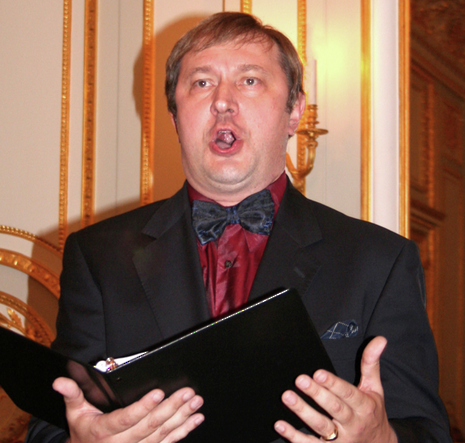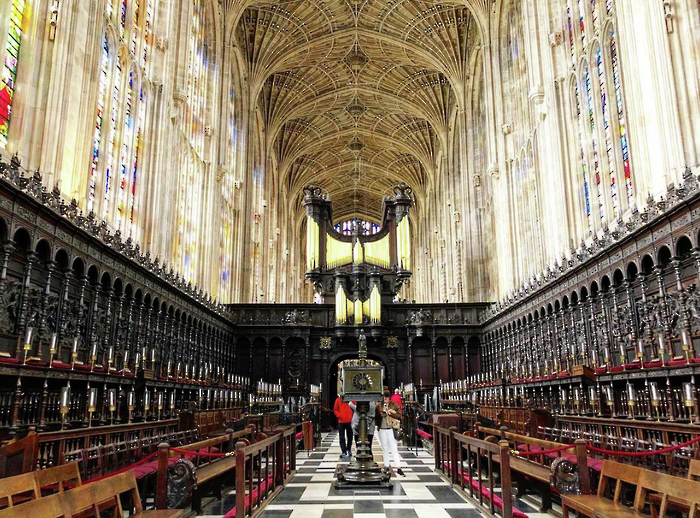CUMS May Week Concert at King’s College Chapel
Alexander Brady finds himself impressed by the Cambridge University Symphony Chorus and Sinfonia, even if the concert peaked in its earlier stages
For their May Week Concert this year, the Cambridge University Musical Society went with a Russian theme, and decided on Mussorgsky and Stravinsky as representatives for Russia’s rich classical tradition.
The orchestra began the concert with Mussorgsky’s Night on a Bare Mountain in its popular arrangement by Rimsky-Korsakoff, and David Angus’s conducting elicited a swirling full-bodied mass of sound in the opening passages, even if the rapid staccato quavers didn’t feel entirely under control at certain points. None of the early momentum was lost in the latter quieter passages, instead converted impressively into a subtler fizzing energy which carried the piece through to its conclusion.
Mikhail Svetlov's performance was so utterly enthralling that it was easy to forget that he was a last-minute replacement
The second piece on the programme – excerpts from Mussorgsky’s opera Boris Godunov – was undoubtedly the most memorable. Despite only having been informed the previous day that Sir John Tomlinson would not be available to sing the title role, the organisers managed to enlist Mikhail Svetlov in his place, and his performance was so utterly enthralling that it was easy to forget that he was a last-minute replacement. His gloriously deep, throaty voice danced from bitter torment to contrition to acquiescence with complete assurance, and the sheer physical effort he expended on his semi-staged role was worthy of a fully staged performance.
The choir and the orchestra, again conducted by David Angus, were excellent, as were Sam Furness as Shuisky and Joseph Zubier (standing in for Hugh Cutting) as Feodor in their comparatively minor roles, but this was undoubtedly Svetlov’s moment, and his performance captivated from start to finish; the organisers must be commended especially for procuring his services.

After the interval Stravinsky took over from Mussorgsky, first with an arrangement of Bach’s Variations on Vom Himmel hoch (conducted by Toby Hession) and second with the neoclassical Symphony of Psalms (conducted by David Angus). Following Svetlov’s Boris Godunov was always going to be a colossal task, and indeed the Variations, while highly assured technically, were comparatively lethargic and rarely ventured far from the middling dynamic range.
The arrangement itself is rather unforgiving in these regards – it is not, in my opinion, one of Stravinsky’s most exciting moments – but the bite and the irreverent drive which make Stravinsky’s orchestrations truly Stravinsky-esque were slightly lacking. Nevertheless, the orchestra and the choir’s cantus firmi were played off each other well and were integrated into a satisfyingly coherent whole.
Concluding the programme, the Symphony of Psalms was more generally successful, the complex contrapuntal passages especially impressive in their relentless forward motion and the choir and orchestra rising and falling together with great grandeur in the final movement, though the final few laudates did begin to plod a little.
In a sense, the thrilling high of Boris Godunov in the first half somewhat spoiled the audience for the second, and it suffered unfairly in comparison. It seems strange to me that the programme was ordered in the way it was (though there may have been practical reasons of which I am unaware), particularly since the chosen pieces of Stravinsky were an arrangement of a set of Baroque variations and a work from his neoclassical period – both pre-Mussorgsky at their respective stylistic cores. However, this should not be thought to take away from the performances themselves, most of which were excellent
 Features / Meet the Cambridge students whose names live up to their degree9 September 2025
Features / Meet the Cambridge students whose names live up to their degree9 September 2025 News / Trinity Street to close for month-long roadworks13 September 2025
News / Trinity Street to close for month-long roadworks13 September 2025 News / New NHS platform causes security concerns in Cambridge12 September 2025
News / New NHS platform causes security concerns in Cambridge12 September 2025 News / Tompkins Table 2025: Trinity widens gap on Christ’s19 August 2025
News / Tompkins Table 2025: Trinity widens gap on Christ’s19 August 2025 Comment / Cambridge South is right to be ambitious13 September 2025
Comment / Cambridge South is right to be ambitious13 September 2025










